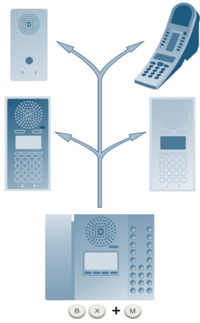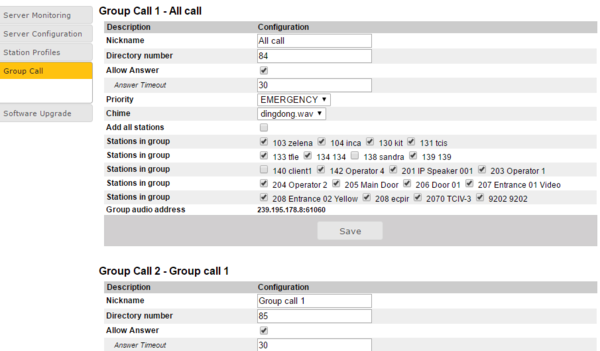Group Call (Pulse)
From Zenitel Wiki
Contents
Operation
The Pulse system supports 4 Group Calls.
A group call is activated by dialing the appropriate code (e.g. 84). A ding-dong signal is heard in all member stations. Press the M-key to speak, and C-key to disconnect. Alternatively, group call can be used in handsfree mode, i.e. no need to press the M-key. Stations without any M-key is using handsfree mode by default. Group call can be answered from any station by dialing the answer code 99.
Group call audio can be sent and received by all Vingtor-Stentofon IP stations and can be sent from most modern SIP IP phones. Group call audio can be received by SIP IP phones that have a support for IP Multicast paging.
Group call will work when Pulse system is installed within multiple inter-routable network subnets.
Default group call settings
The factory default settings for group calls are as follows:
| Nickname (Display text) | Directory number | Priority | Group members | Chime | Answer |
|---|---|---|---|---|---|
| All call | 84 | Emergency | All stations | Ding Dong | Yes |
| Group call 1 | 85 | High | None | Ding Dong | Yes |
| Group call 2 | 86 | Normal | None | Ding Dong | Yes |
| Group call 3 | 87 | Low | None | Ding Dong | Yes |
These settings can be customized under Server Management > Group Call.
Configuration of group calls
The group call properties are configured via the Pulse Server.
- Use a web browser and log into the Pulse Server station (e.g. 169.254.1.99)
- Select Server Management > Group call
- Change the parameters for each group are required:
- Nickname: This is the display text shown in the initiating station when the group call is activated. Can be any text.
- Directory number: The number to dial to activate the group call. If changed, a reboot of the Pulse Server is required for the changes to take effect.
- Allow Answer: Enable Group call answer and configure Answer timeout. Default value is 30 sec timeout to make answer after group call was terminated. Timeout value of 0 means answer is only possible during the group call.
- Priority: A group call with higher priority will override a lower priority group call.
- LOW/NORMAL: The group call audio is not played if there is an ongoing conversation
- HIGH: The group call audio is mixed with conversation audio
- EMERGENCY: Conversation audio will be muted. Includes a Volume and handset override feature. The volume is turned to maximum level on all receiving stations, and the audio comes out of the loudspeaker even if the handset is off-hook.
- Chime: Enable playing of ding-dong chime when a station receives Group call.
- Stations in group: Select the stations to be group members. You can select all stations in one operation by checking Add all stations box.
- Save: There is a Save button for each group call. Remember to press Save before you make changes to the next group call.
- Group Call audio multicast Address: Multicast IP address and port used to send audio during group all. These information can be used to set up Pulse group call (multicast page) on 3rd party SIP stations.
Allowed Group calls (Station Profiles)
In the Station Profiles you can define which stations are allowed to initiate group calls (Server Management > Station Profiles > Group calls allowed).
Answer function (Meet Me)
If a group call has the "Answer Allowed" option enabled, the group call can be answered by dialing 99 or by pressing a DAK key configured to answer Group call.
The IP station answering the group call and the station which started the group call are automatically connected in a normal point-to-point conversation according to configured conversation mode (PTT/open duplex).
Answering a Group call before it is hanged-up by originator will end the group call. The group call will be active until the answer timer expires, allowing a Group call member to answer even after the originator hangs up. Answer call will also interrupt Group call recall function on VS-Client; meaning, recorded message will only be partially played out.
If there are no active group calls, then the answering station will get an error back (SIP ERROR 404 "Not found").
For 3rd party SIP station to answer group call, it needs to support RFC 3891: The Session Initiation Protocol (SIP) "Replaces" Header. Not all 3rd party SIP stations support this.
Group call audio codec
G.711, G.722, G.729 codecs are supported. Group call shall use codec according to Call settings of the call originator. Audio codec with highest priority will be selected for outgoing Group Call. Stations that receive Group call shall always use codec of the incoming Group Call, even if that means to override station local Call Settings.
Troubleshooting
Q: When making a group call, the ding-dong is heard in the stations, but no audio.
A1: The problem is that the multicast audio does not reach the stations, which may be because of two things:
- If the stations are using static IP address you need to set the Gateway address for all stations. Login to the Pulse Server, go to Main Settings and set the Gateway address to be the Pulse Server IP Address (unless you have a real gateway). Go to Server Management -> Server Configuration, click “Save” then “Apply”. Now all stations should have a gateway address.
- The network switch may drop multicast packets (For example Linksys ”business series” switches drops all multicast packets with default configuration). If this is the problem you will need to check the manual for the network switch.
A2: Third party SIP phones cannot initiate group calls. Ding-dong is transmitted, but there will be no audio. Reason being that in group call the calling station distributes audio using multicast, which is not supported by 3rd party SIP phones.


